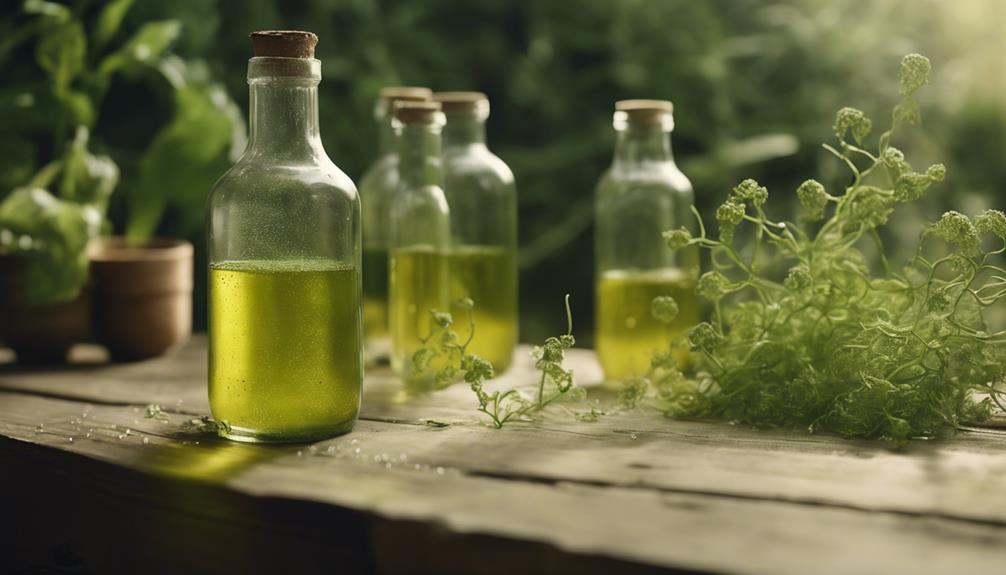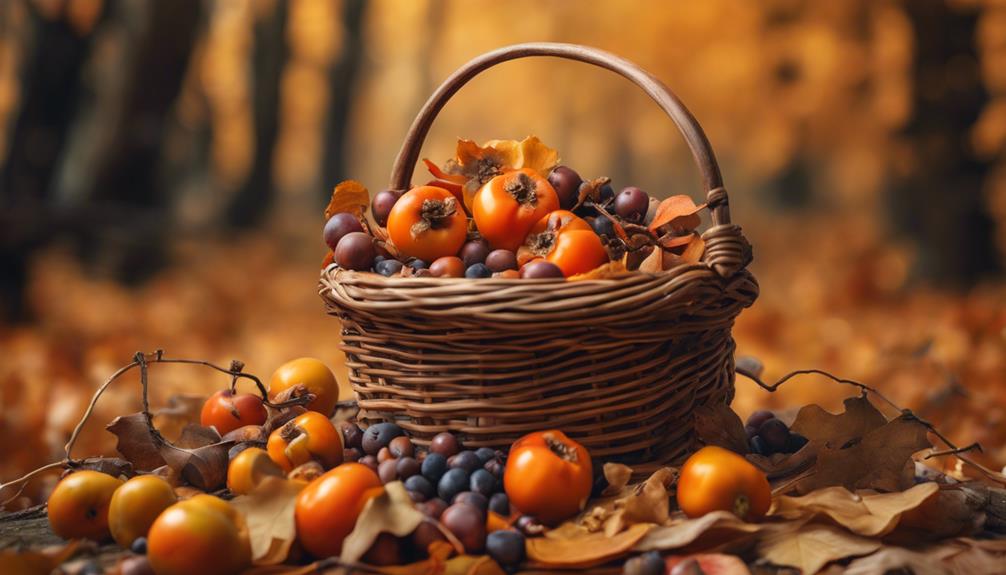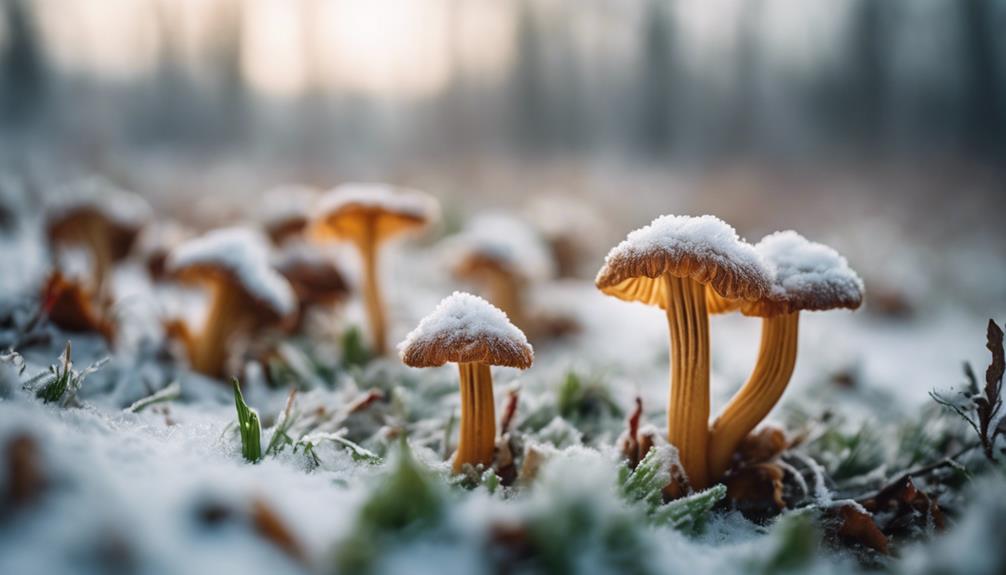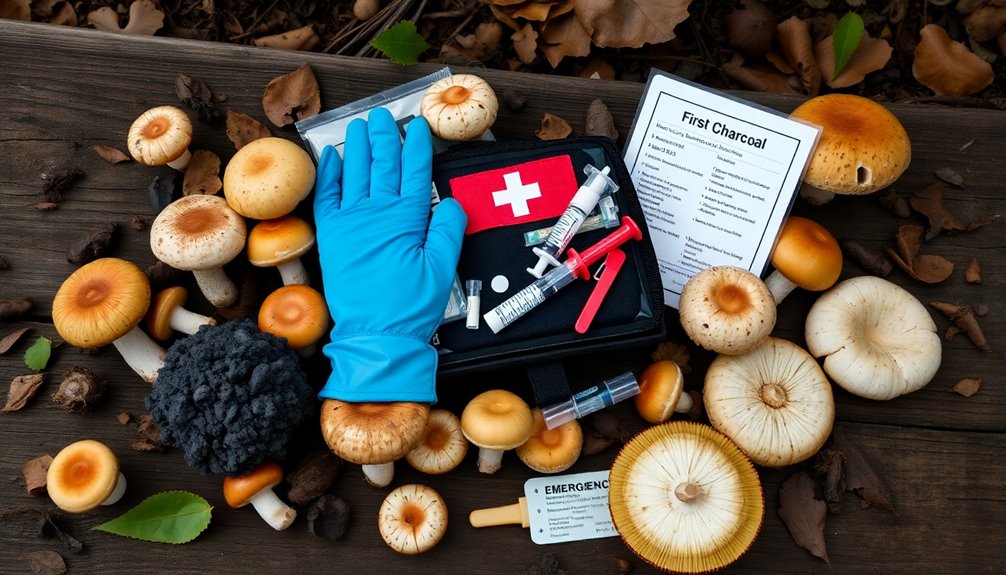You're wondering if Forage Kombucha has alcohol. The truth is, it typically contains less than 0.5% ABV, making it a safe and guilt-free treat. This low level of alcohol is in line with non-alcoholic beverage standards, so you can enjoy it without worrying about getting drunk. Factors like fermentation duration and yeast strains affect the alcohol content, but Forage Kombucha's meticulous management guarantees a safe and enjoyable drink. Want to learn more about what makes Forage Kombucha a reliable choice and how to handle it safely? In addition to alcohol, you might also be curious about *Forage Kombucha caffeine content*, as kombucha is typically brewed with tea, which naturally contains caffeine. Fortunately, the caffeine levels in Forage Kombucha are relatively low, since much of the caffeine is reduced during the fermentation process. This makes it a refreshing beverage option for those looking to limit their caffeine intake while still enjoying the health benefits of kombucha. Additionally, it’s worth noting that Forage Kombucha strives to maintain transparency around both alcohol and caffeine levels, so you can confidently incorporate it into your daily routine. Whether you’re sipping it as a mid-morning refresher or a post-workout boost, the forage kombucha caffeine content remains mild enough to avoid jitters while delivering a pleasant, natural energy lift. With its carefully crafted formula, Forage Kombucha strikes a perfect balance between taste, health benefits, and mindful consumption.
Key Takeaways
- Forage Kombucha contains less than 0.5% ABV, making it a low-alcohol, guilt-free treat.
- Regulatory guidelines ensure compliance with non-alcoholic beverage standards, guaranteeing a safe drink.
- Factors like fermentation duration and yeast strains affect alcohol levels, which are carefully managed for safety and enjoyment.
- Recovered alcoholics, pregnant/breastfeeding women, and individuals with health concerns should be cautious or monitor their intake.
- Proper storage in the refrigerator slows down fermentation, maintaining drink quality and minimizing health risks.
What Is Forage Kombucha?
When you crack open a bottle of Forage Kombucha, you're not just getting a tasty drink – you're getting a product that's deeply committed to organic and raw ingredients, sustainability, and transparency.
Forage Kombucha is a brand that stands out from the crowd, offering a range of unique flavors like Ginger Hibiscus, Blueberry Basil, and Turmeric Sunrise. But what sets them apart is their dedication to using only natural ingredients and real fruit juices in their brewing process.
This commitment to quality and sustainability means you can rest assured about what you're putting in your body. Forage Kombucha's focus on organic ingredients and eco-friendly practices ensures that you're not only getting a delicious drink, but also supporting a brand that cares about the planet.
And with strict guidelines in place to regulate alcohol content, you can trust that you're getting a product that's safe and reliable. With Forage Kombucha, you can indulge in a guilt-free treat that's not only tasty but also good for you and the environment.
Is Forage Kombucha Alcoholic?

As you explore the world of Forage Kombucha, you might wonder: is it really alcoholic?
The answer lies in the fermentation process, which naturally produces a small amount of alcohol.
Let's take a closer look at the factors that influence the ABV levels and what that means for you, the consumer.
Fermentation Process Matters
By controlling the fermentation process, Forage Kombucha's manufacturers carefully regulate the amount of alcohol produced, ensuring the final product stays within the non-alcoholic beverage category. This process involves yeast breaking down sugars into organic acids, carbon dioxide, and trace amounts of alcohol. Factors like fermentation time, temperature, and yeast strains impact the alcohol levels in Forage Kombucha.
Here's how the fermentation process affects the alcohol content:
| Fermentation Factor | Impact on Alcohol Levels | Result |
|---|---|---|
| Fermentation Time | Longer time increases alcohol levels | Minimal alcohol content with controlled fermentation |
| Temperature | Higher temps increase yeast activity, producing more alcohol | Regulated temperature for minimal alcohol |
| Yeast Strains | Certain strains produce more alcohol than others | Selected yeast strains for minimal alcohol |
| Sugar Content | Higher sugar levels increase alcohol production | Balanced sugar content for minimal alcohol |
As a result, Forage Kombucha typically contains minimal alcohol due to controlled fermentation, making it a non-intoxicating beverage option.
ABV Levels Explained
You're likely wondering what the actual alcohol content of Forage Kombucha is, and whether it's considered an alcoholic beverage. The answer lies in its ABV levels. Forage Kombucha typically has an alcohol content below 0.5% ABV, making it a non-alcoholic drink.
But what affects its alcohol content? The fermentation duration and yeast strains used in the brewing process play a significant role. The longer the fermentation period, the higher the alcohol content. However, Forage Kombucha's brewers carefully manage these factors to guarantee compliance with regulations.
As a result, the final product contains minimal alcohol, making it suitable for all ages. You can enjoy Forage Kombucha responsibly, knowing it's made with careful attention to its alcohol content.
How Much Alcohol Is Present?

What's the actual amount of alcohol in Forage Kombucha, and how does it compare to other kombucha brands?
You might be surprised to learn that Forage Kombucha typically contains less than 0.5% alcohol by volume (ABV). This trace amount is due to the fermentation process, which naturally produces a small amount of alcohol.
In comparison, other non-alcoholic kombucha brands have similar alcohol content. Regulatory guidelines require Forage Kombucha to maintain alcohol levels below 0.5% ABV to be considered a non-alcoholic beverage.
To put this into perspective, a 5% ABV beer would be 10 times stronger than Forage Kombucha. Forage Kombucha's low alcohol content ensures it complies with the regulatory guidelines for a non-alcoholic beverage.
This means you can enjoy the health benefits of kombucha without worrying about consuming excessive amounts of alcohol. So, rest assured that Forage Kombucha is a safe and healthy choice for those looking for a fermented tea drink.
Factors Affecting Alcohol Content

As you enjoy the benefits of Forage Kombucha, it's interesting to explore the factors that influence its alcohol content, which can vary depending on fermentation duration and yeast strains.
You might wonder, what exactly affects the alcohol content of your favorite fermented tea drink? The answer lies in the fermentation process. Longer fermentation periods typically result in higher alcohol levels in Forage Kombucha. This is because the yeast has more time to convert the sugars into alcohol.
The type of yeast strain used also plays a significant role in determining the final alcohol content. Different yeast strains can produce varying levels of alcohol, which is why Forage Kombucha's alcohol content may vary batch to batch.
Understanding these key factors can help you make informed choices about your Forage Kombucha consumption. By being aware of the factors that affect the alcohol content, you can better appreciate the craftsmanship that goes into creating this unique beverage.
Who Should Avoid Forage Kombucha?

When considering your consumption of Forage Kombucha, it's crucial to recognize that certain individuals should exercise caution or abstain from drinking it altogether. As a responsible consumer, you should be aware that Forage Kombucha may not be suitable for everyone.
Recovered alcoholics, for instance, may want to avoid it due to their sensitivity to even minimal amounts of alcohol, despite meeting non-alcoholic standards. Pregnant or breastfeeding women should also consult their healthcare providers before consuming Forage Kombucha, as a precautionary measure.
Additionally, individuals with alcohol sensitivities or health concerns should monitor their reactions to Forage Kombucha, as they may be more susceptible to adverse effects. Prioritizing your health and well-being by being mindful of these guidelines is crucial.
Is Forage Kombucha Safe to Drink?

You can confidently drink Forage Kombucha, knowing it meets the non-alcoholic standard with an alcohol content below 0.5% ABV. This guarantees that it's safe for most individuals to enjoy in moderation.
The fermentation process in Forage Kombucha naturally produces a trace amount of alcohol, but it's well within the limits set by the Alcohol and Tobacco Tax and Trade Bureau. In fact, Forage Kombucha undergoes rigorous testing to ensure compliance with these regulations.
As with other fermented foods, the level of alcohol in Forage Kombucha is carefully monitored to guarantee a safe and enjoyable drinking experience.
If you're concerned about drinking kombucha, rest assured that the amount of alcohol is negligible, making it suitable for recovering alcoholics and those who want to avoid alcohol altogether.
Can I Get Drunk on Forage Kombucha?

You're probably wondering if you can get drunk on Forage Kombucha, but the truth is, the chances are extremely low. With an alcohol content of less than 0.5%, you'd have to consume an unrealistic amount to feel any effects.
Let's break down the fermentation process and explore the scenarios where intoxication is highly unlikely.
Kombucha's Fermentation Process
During the fermentation process, Forage Kombucha's SCOBY (Symbiotic Culture of Bacteria and Yeast) feeds on the sugary tea, producing a small amount of alcohol as a byproduct. This natural fermentation process is what makes Forage Kombucha a fermented tea drink. As you explore the world of fermented beverages, you might wonder how much alcohol is produced during this process.
| Fermentation Stage | What Happens |
|---|---|
| Initial Fermentation | SCOBY feeds on sugary tea, producing a small amount of alcohol |
| Primary Fermentation | Yeast and bacteria convert sugars into carbon dioxide and ethanol |
| Secondary Fermentation | Flavor profile develops, and bacteria continue to ferment |
| Bottling and Storage | Fermentation slows down, and the drink is ready for consumption |
| Consumption | You enjoy your naturally fermented, slightly effervescent Forage Kombucha! |
The amount of alcohol in kombucha varies depending on factors like fermentation time, yeast strain, and sugar content. In the case of Forage Kombucha, the fermentation process is carefully managed to ensure the final product meets industry standards for alcohol content. As a result, the amount of alcohol in Forage Kombucha is typically below 0.5% ABV, making it a suitable choice for those looking for a low-alcohol, naturally fermented beverage.
Low ABV Levels Explained
With Forage Kombucha's alcohol content typically below 0.5% ABV, it's no surprise that getting drunk on this fermented tea drink is extremely unlikely.
You can enjoy your favorite flavor of Forage Kombucha without worrying about the alcohol content. The low ABV levels in Forage Kombucha make it a non-alcoholic beverage, complying with regulations that guarantee the drink remains safe for consumption.
As a fermented tea drink, Forage Kombucha undergoes a natural fermentation process, but the alcohol content remains minimal. You can savor the taste and benefits of Forage Kombucha, knowing that the low alcohol content won't impair your judgment or cause intoxication.
Enjoying Forage Kombucha in moderation is safe due to its minimal alcohol content. So, go ahead and indulge in your favorite Forage Kombucha flavor, knowing you're sipping on a fermented tea drink that's both tasty and safe.
Intoxication Unlikely Scenarios
As you savor the fizzy goodness of Forage Kombucha, it's natural to wonder: can you really get drunk on this fermented tea drink, or is it just a myth? Let's put your mind at ease. The truth is, Forage Kombucha is highly unlikely to cause intoxication due to its extremely low alcohol content.
Here are three scenarios that illustrate the non-intoxicating nature of Forage Kombucha:
- Low alcohol levels: Forage Kombucha typically contains less than 0.5% ABV, making it a non-alcoholic beverage.
- Safe consumption: Enjoying Forage Kombucha in moderation is safe and non-intoxicating, so you can savor the flavor without worrying about getting drunk.
- Responsible enjoyment: Consuming Forage Kombucha responsibly won't lead to drunkenness or intoxication, allowing you to enjoy the health benefits and unique taste without concern.
Storage and Handling Considerations

You should always store your kombucha in the refrigerator to slow down fermentation and prevent a significant increase in its alcohol content. Refrigerator storage is vital to maintain the drink's quality and safety.
If you store kombucha at room temperature, the fermentation process will continue, leading to a rise in alcohol levels, changes in taste, and even vinegar formation. This can be particularly concerning for individuals with sensitivities to alcohol, caffeine, or specific health conditions. Pregnant or breastfeeding women should also handle and store kombucha carefully to avoid potential health risks.
When handling kombucha, it's important to take into account the risks associated with improper storage. By storing your kombucha in the refrigerator and handling it properly, you can enjoy this fermented tea drink while minimizing its potential health risks.
Frequently Asked Questions
Does Kombucha Have Traces of Alcohol?
You're wondering if kombucha has traces of alcohol? Yes, you're right to ask! Kombucha typically contains tiny amounts of alcohol, usually below 0.5% ABV, due to the fermentation process, but it's still non-intoxicating.
How Much Alcohol Is in Forage Kombucha?
Are you wondering how much booze you'll get from sipping on Forage Kombucha? Relax, you'll find less than 0.5% alcohol, a natural byproduct of fermentation, making it a safe, non-intoxicating drink for you to enjoy!
How Do I Make Sure My Kombucha Is Not Alcoholic?
To guarantee your kombucha isn't alcoholic, you'll want to monitor fermentation time, use low-alcohol yeast strains, and check temperature, ingredients, and brewing methods, as these factors can influence alcohol levels in your homemade brew.
Can Kombucha Show up on an Alcohol Test?
You're wondering if kombucha can show up on an alcohol test? Don't worry, the trace amounts of alcohol in kombucha are unlikely to register on a test, so you won't get a false positive.
Conclusion
You've made it to the end of this Forage Kombucha thorough exploration! Now you know the truth: Forage Kombucha does contain some alcohol, but not enough to get you drunk.
In fact, did you know that the average American consumes around 2,000 calories per year from fermented foods and drinks, including kombucha?
Enjoy your Forage Kombucha, but remember to store it properly and handle with care to minimize the booze factor. Happy sipping!










